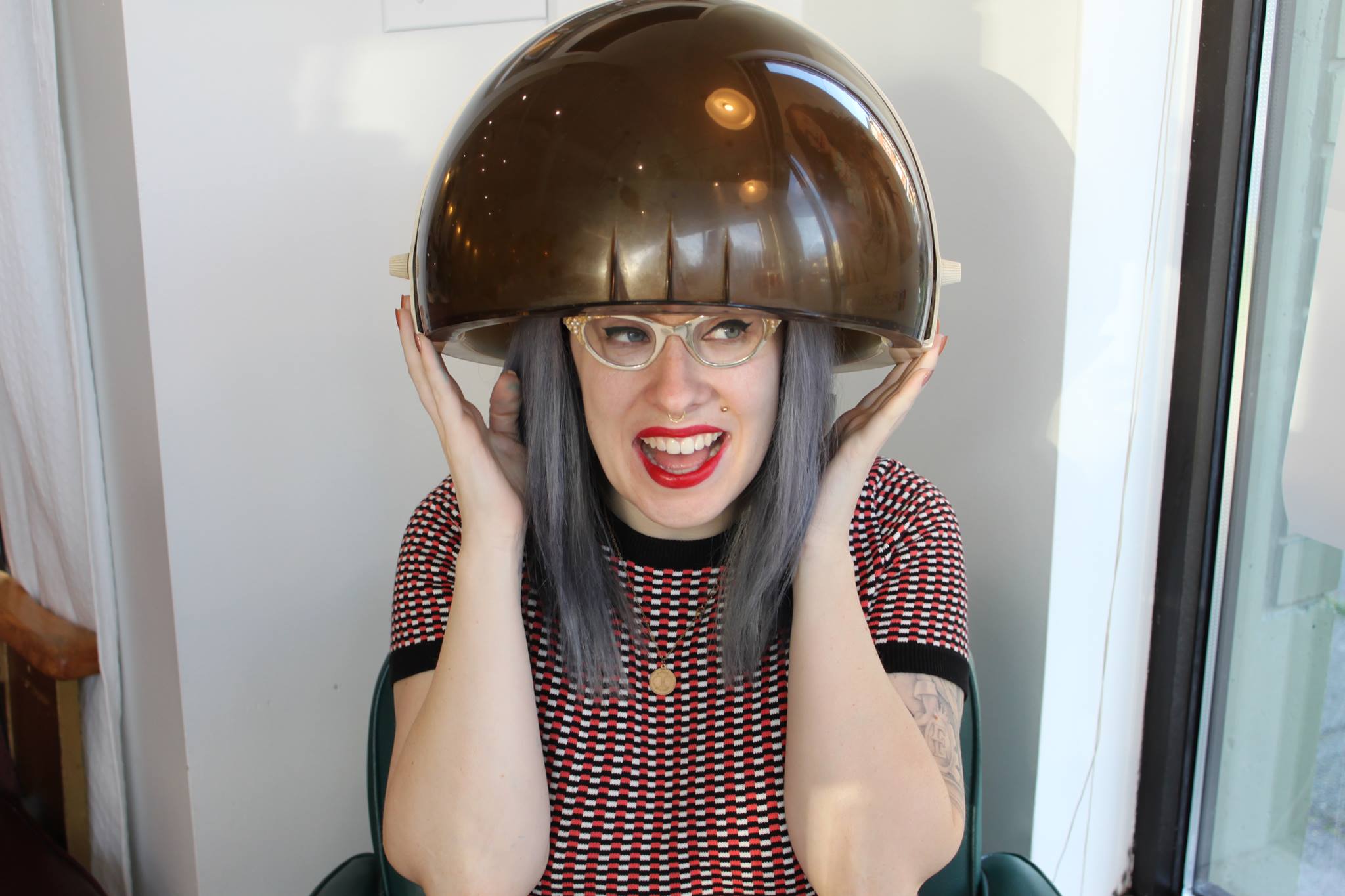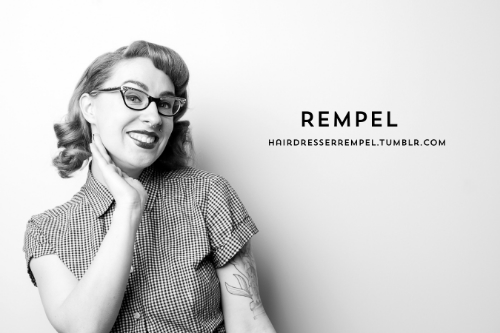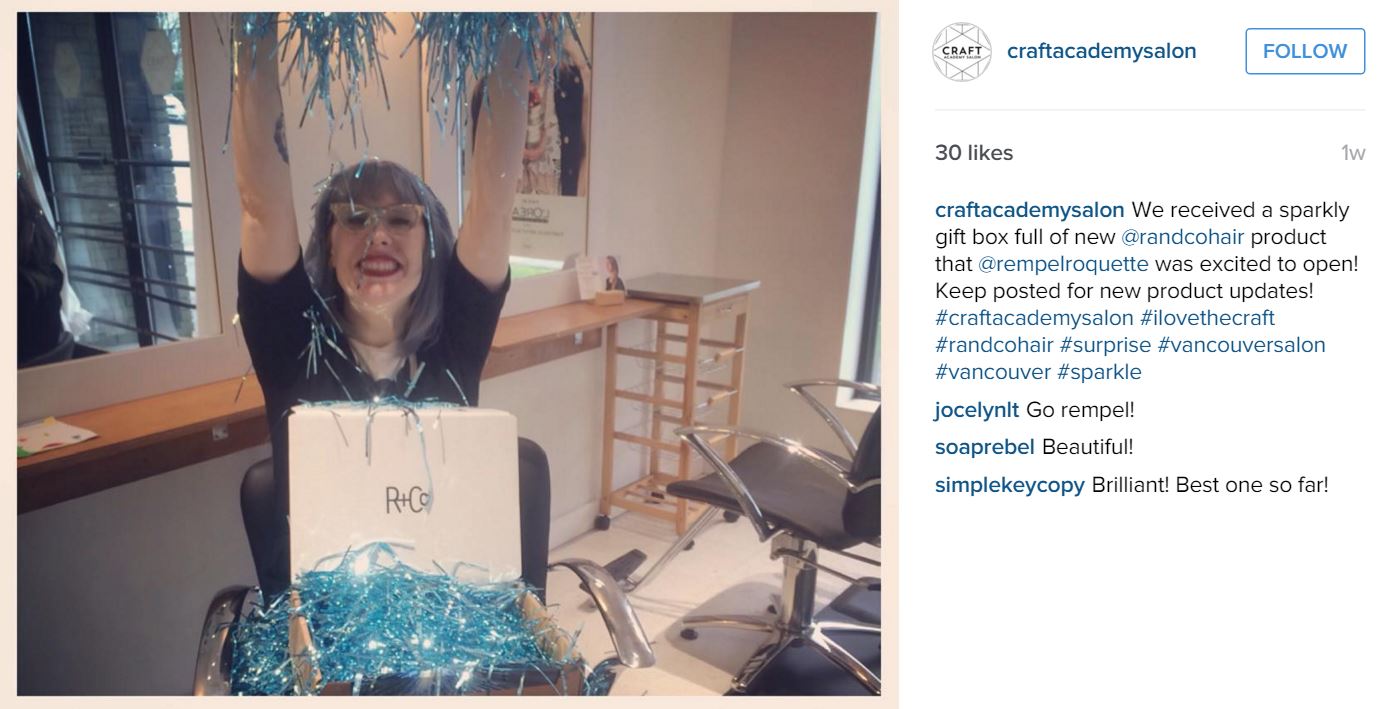By Aleksandra Golubovic
@bigdeadrat
Maybe it’s her name, or her hair, or the indelible impression she makes on people, but ever since her teens, wherever she went, people would recognize Rempel.
It was as if she was mildly famous for no clear reason. But a couple of years after she started doing hair, that recognition shifted from a vaguely social context into a professional one.
“You know Rempel?” people with nice hair would ask. “She does my hair!”
Her distinctiveness might have helped her in the early stages of her career but besides being gregarious and disarmingly charming, she also tends to linger on your retinas. Her own locks are kaleidoscopic in their colour and changeability, and her signature eyewear is always unique.

But while being memorable was no doubt instrumental in building up her clientele, Rempel has been honing her craft for over a decade, and now it’s her work, and not her look, that speaks the loudest.
Blondes come to her in droves, because she gets them. But Rempel seems to excel at whatever you throw at her. She’s mastered the art of a great consultation, so getting you what you want has sort of become her specialty; her skill set adamantly refuses pigeonholing.
I asked Rempel why this is so, and she’s quick to answer: “education.”
Rempel isn’t content to simply come to work, do her job, and go home. She’s a voracious learner, and she truly sees this as her craft.
“On the first day of hair school, they told us that 50% of us would drop out of the program before it was over,” she says.
“And that of the 50 per cent who made it and started working in salons, another 50 per cent would drop out of the industry within five years.”
That prophecy came true, as prophecies do. When I asked her why, Rempel tells me, “it’s tough when you’re starting out. You don’t make a lot of money in the beginning, and you work your ass off.”
Rempel reckons she’s one of the only people from her (admittedly small) graduating class is still doing hair, but watching this woman at work and witnessing her passion, it’s no surprise she’s still in the hair game.
“You’ve got all these people who go through school and think that’s it,” she delves. “But that’s just the beginning!”
The emphasis on continuing education is part of the reason Rempel is so happy with her home at CRAFT Academy Salon.

Tanya Sullivan, CRAFT Academy’s owner, is the visionary behind this mentorship salon. The salon is built on principles of constantly expanding education and knowledge sharing.
Rempel recently became part of the Creative Council for R+Co, a role that has her travelling to the company’s academy in Miami for training, and then returning to the salon to teach her colleagues what she’s learned.
Rempel gets pretty gooey when I ask her how she likes working at CRAFT.
Her passion for education dovetails with her affinity for cooperation, making her a natural fit. “Top hairdressers share,” Rempel insists. “It drives me nuts when hairdressers try to keep their tricks secret. Like, why wouldn’t you help someone if you can?” Rather than jealously hoarding their know-how, Rempel believes that professionals — in any industry — should help each other in order to up the ante for everyone.
“It’s the clients that suffer when hairdressers don’t share their knowledge and their skills with each other,” she says, collateral in an ego war they don’t even know is going on. That doesn’t happen at CRAFT, where Rempel admits to leaving detailed notes on all her clients’ formulas, to empower her colleagues in case they ever need to look after them.

Here’s another thing about CRAFT: its current staff is entirely female.
The Girls Club aspect is notable. While the majority of hairstylists are women, men are more likely to own the salons, and the top professionals in the industry are men. In this way, the salon is similar to the commercial kitchen.
Despite the efforts of many generations of feminists, food preparation remains ideologically rooted within the female sphere, and yet, most top chefs are male.
This phenomenon has been attributed to men’s allegedly superior commitment to their careers, unencumbered by that pesky female desire to drop everything and rear children.
But it’s also a product of how we are trained to perceive men and women. Men occupy the upper echelons of hairdressing “in part because they more easily meet prevailing notions of professionalism that have long privileged men regardless of occupation.”
And in hairstyling in particular, the privileging of male hairdressers has also been attributed to a female clientele desirous of harnessing the male gaze on their heads.
The patriarchy runs so deep that women are often second to men even in their own traditional domains. Rempel, however, doesn’t seem too worried.
The way she sees it, if you want to be the best, then you have to support those around you to be the best they can be as well. Because what’s the point of being the best among a mediocre, stunted bunch?
In this way, Rempel is not only ultra cooperative but ultra competitive, all at the same time.Yet she maintains coherence, the miracle of her existence illustrating the complementarity of opposites.
“I still wanna be a professional while looking like a weirdo,” she says. “I want people to take me seriously, even if I have silly hair.”

Aleksandra is a Balkan babe who speaks at least three languages, hawks fresh fish, and is likely the most well-read globetrotter you’ll ever meet. You can expect to run into her in any corner of the world, most currently in El Salvador where she’s delivering 12,000 condoms to young women in response to the Zika virus.



